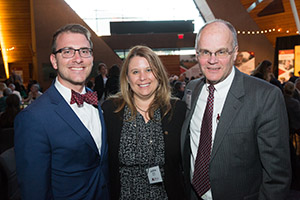When Justine Mishek (MHA ’02) knew she wanted to leave her job in Minnesota state policy and attend graduate school, she looked at a number of programs. She learned of the Minnesota MHA Program from fellow MHA alum Marie Dotseth (MHA ’92) and ultimately chose the program because she wanted to learn more about the internal operations of health care.

“I felt very grateful to have met Marie and to have been accepted into the program,” Mishek said, reflecting on her first day of orientation in 2000. “I thought it was a perfect blend of the inner workings of health care delivery, policy, and public health.”
After completing her fellowship and working in a product development role with Kaiser Permanente for almost a decade, Mishek moved back to Minnesota. In her new role at Fairview, Cari Worner (MHA ’00) invited Mishek to be a problem solving site case faculty advisor with her, and from there, Mishek continued to give more and more of her time to the program in various roles.
“It was a natural fit for me to teach while practicing in health care,” said Mishek. “New ideas and bright minds are essential for improvement in health care; it was inspiring to see new students solve complex issues. I was reminded how important the problem solving method was for my career to date and how impactful it can be for each student.”
Over time, Mishek spent more time teaching within the program and now sits on the MHA Program Leadership Team. Following in the steps of legends and mentors, such as Sandy Potthoff and Greg Hart (MHA ’76), Mishek now leads the program’s renowned “Minnesota Way of Problem Solving.”
“I am very proud of Mishek, to see her grow as both an educator and as an alum, her commitment to students and the heritage of our program shines through in every interaction,” said Hart.
In her role, Mishek sees firsthand the impact of philanthropy.
“I remember working hard when I was a student — although today’s students seem to have to balance more pressures alongside coursework,” said Mishek. “What has changed is the number of activities each student can participate in outside of the classroom and the debt students carry with them from undergrad. Philanthropy and scholarship for a student can mean the difference of a student having to work vs. the ability for students to participate in enriched health care related activities, such as case competitions, student leadership roles, networking, and health care related volunteer activities.”
In 2017, Mishek and her husband, Nicholas Quinn, decided to include the MHA program in their annual giving and estate plans to further support students. They established the Class of 2002 Scholarship in hopes of inspiring classmates and other alumni to give back to the program and support the next generation of health care administration leaders.
“I received a scholarship when I was a student and at that time, relatively speaking, tuition wasn’t what it is now,” Mishek explained. “I believe it’s important to do my part to support scholarships in the MHA Program so that we can attract the brightest, most diverse and interesting students that seek to add new value in health care. I believe our collective alumni gifts —no matter the amount — will help provide our students more time and space to explore health care with less financial pressure during their time in school. I hope other alumni, regardless of career phase, will decide to not only offer their time to students, but also their financial contributions. When our alumni participate in giving back, there is a clear impact for our students.”
To join Mishek in giving back to the MHA program, go online (http://give.umn.edu/giveto/sphmha) or contact us (mhaalum@umn.edu).
